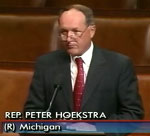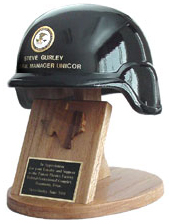 |

|

|
The future of FPIBy Chuck Armsbury, November Coalition
While Bush lavished praise and promise on Boeing workers who are nervous about further industry-layoffs, only 50 miles northeast in FCI Greenville, Illinois, prisoners in the enclosed Federal Prison Industry (FPI) plant were working without presidential praise, designated breaks or fear of layoffs. These captive workers produce about 1,000 desert-tan camouflage shirts per day. Almost 200,000 of these shirts were bought by the Department of Defense to be worn by infantry troops in the Middle East. At another FPI factory (or UNICOR plant, another acronym for the same bureaucracy) in Marion, Illinois, prisoners are busy "soldering millions of dollars worth of cables for the Pentagon's TOW and Patriot missiles." As revealed, the Bush Administration's strategy is to capitalize on the US military's successful invasion of Iraq, but by reassuring nervous Boeing workers - while ignoring thousands of confined workers engaged in similar war production - Mr. Bush has raised eyebrows and varied questions from many quarters. Few observers, however, question that without a captive prison labor force, the military would be unable to meet its needs for everything from weaponry components and shirts to the 100% of battlefield headgear made at FCI Beaumont, Texas. With more than 20,000 prisoners at work for FPI, in 2002 the government's thirty-ninth largest supply-contractor sold $678.7 million worth of goods and services to the US government. Over $400 million was purchased by the Department of Defense. From its founding in 1934, Federal Prison Industries has operated for war production primarily. According to Urbina, during the Korean War, 80% of FPI output went to defense. Maximum-security federal prisoners were producing cables for Polaris submarines at McNeil Island Penitentiary in Washington State during the Vietnam War. Successful use of captive labor does raise
serious questions, and should. Concerns about security have been
leveled against the use of prisoners to build sensitive, electronic
equipment that affects the safety of US soldiers. Other voices
ask whether the expanding use of confined labor has adverse affects
more broadly, and the answer is a resounding YES from both left
and right pundits. Over the last few years, new objections to FPI profiteering have come from the AFL-CIO, US Chamber of Commerce, and private furniture manufacturers, allied in opposition to the non-competitive policies that presently govern FPI contracts and sales. The main issue for these groups is how to reform FPI's monopolistic stranglehold on sales to other government agencies. Critics contend FPI abuses its sole-source provider (of products and services) duty for these agencies, and does so to the general detriment of taxpayers and private industry.
Does this feel like a 'watershed' moment? Where do we go from here? What is to be done? Write your leaders! New legislation addressing FPI's mission and general policies has passed the House of Representatives. On November 6, 2003 the House approved HR 1829, a bipartisan-supported measure with promise for the betterment of captive labor, including job training, general education, wage rates and job placement. No one doubts there's political tightrope walking to be done as this Act now awaits Senate action. There are complicated private and public interests to sort out. Add in the many prisoners who eagerly want those UNICOR jobs for the 'good pay' offered. Yet, we're still a nation in which thousands of drug convictions and lengthy, mandatory sentences have produced this captive worker's pool with little incentive to improve self and work for an early release that can't be earned under current law. Furthermore, what can be the meaning of 'rehabilitation' when the prison job being done has little or no useful transferability to the outside community's employment market? Or if FPI subverts and thwarts the skills prisoners may develop in FPI plants, as observed by publisher Tom Adkins of CommonConservative.com in October 2002. Adkins wrote that "inmate Steve Moore committed himself to rehabilitation, becoming a model FPI grad. After his 1988 release, he started Moore Superior Services, specializing in solving UNICOR's unending installation problems." Moore's business boomed for 10 years until his contracts with FPI were taken over by FPI itself. Moore said, "UNICOR could have used me to show other inmates that working for them is worthwhile, and that you can prosper on the outside. Instead, UNICOR took the business I developed, and destroyed it." Moore's loss defies common reasoning. Most prisoners' families on the outside definitely want their captive loved ones to come home healthy, with new skills and education to demonstrate rehabilitation. In short, better people with prospects for an honest income if possible, and even appreciative of the community they call 'home.' It's not 'news' that prisons are overcrowded, or that prisoner labor is exploited for profit. Yet, something 'new' is appearing from this 'old' argument over captive labor in the words of Reps. Hoekstra and Jackson-Lee standing up and calling for new thinking about early release. HR 1829's supporters say the bill encourages
the use of eligible federal prisoners to perform public service
projects, especially with not-for-profit organizations. The bill
increases access to the types of remedial and modern hands-on
vocational education that studies have consistently shown to
better reduce recidivism. "FPI is now focused on making money and annually expanding its federal contract sales," Hoekstra said. "My bill will refocus them on inmate rehabilitation. No linkage exists between the benefits of inmate work and FPI's corrosive mandatory source status." In 2004 we expect to be reporting on varied legislative proposals for earned, early release that will define sensible policies to reconcile competing interests in prison labor, its training, rehabilitative purpose and future. Furthermore, independent, grassroots' organizations, such as November Coalition, will insist on more significant roles of advise and consent in future administrative decisions about the releasability of prisoners to their communities. We are the ones they come home to, those who love them, and who can best assure their long-term success in the greater community. Precious hope is renewed daily as prisoners,
their loved ones and active citizens, despite much adversity,
continue to speak out, stand up, rally and demand fundamental
change in the laws and policies governing drug and sentencing
policy. Ed. note: This is not a parody, this is verbatim from the UNICOR website page as of 2/25/03, from their Online Marketplace pages at: www.unicor.gov/elecbusgrp/elechelmet.htm UNICOR Marketplace
|
 On April
2003 President George W. Bush visited the shop floor at the Boeing
plant in St. Louis, Missouri. He flew there to thank workers
who build F-18 Hornet fighter jets, and assure them of future
employment even in these economic hard times. Notably, Bush's
"Hardware in the Heartland" tour skipped a number of
other war-production plants in the area that are located within
federal prisons, wrote Ian Urbina, reporter for The New York
Times, in an Internet article published in late-September
2003.
On April
2003 President George W. Bush visited the shop floor at the Boeing
plant in St. Louis, Missouri. He flew there to thank workers
who build F-18 Hornet fighter jets, and assure them of future
employment even in these economic hard times. Notably, Bush's
"Hardware in the Heartland" tour skipped a number of
other war-production plants in the area that are located within
federal prisons, wrote Ian Urbina, reporter for The New York
Times, in an Internet article published in late-September
2003. Within the last year public hearings in Congress
have disclosed financial problems at FPI. Rep. Peter Hoekstra
(R-MI), Rep. Sheila Jackson-Lee (D-TX) and numerous congressional
allies have compelled FPI executives to explain loss of sales
and to lay off personnel. Furthermore, the bureaucracy's executive
leadership admits that FPI cannot continue to build prison factories
at the pace the Bureau of Prisons desires, 16 new prisons in
next five years.
Within the last year public hearings in Congress
have disclosed financial problems at FPI. Rep. Peter Hoekstra
(R-MI), Rep. Sheila Jackson-Lee (D-TX) and numerous congressional
allies have compelled FPI executives to explain loss of sales
and to lay off personnel. Furthermore, the bureaucracy's executive
leadership admits that FPI cannot continue to build prison factories
at the pace the Bureau of Prisons desires, 16 new prisons in
next five years. Military or Law Enforcement Recognition Award
Military or Law Enforcement Recognition Award